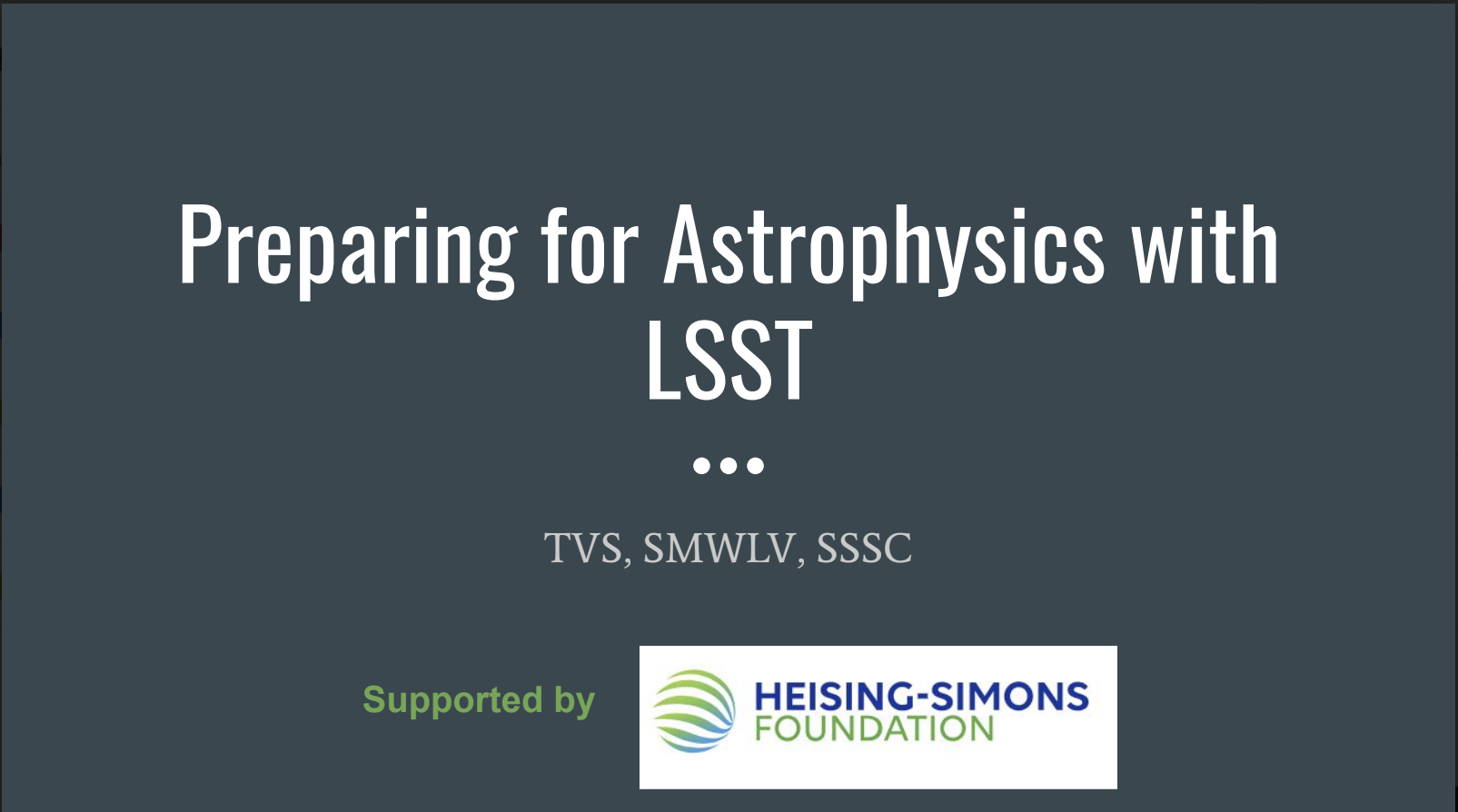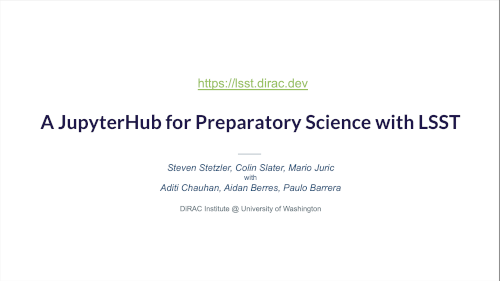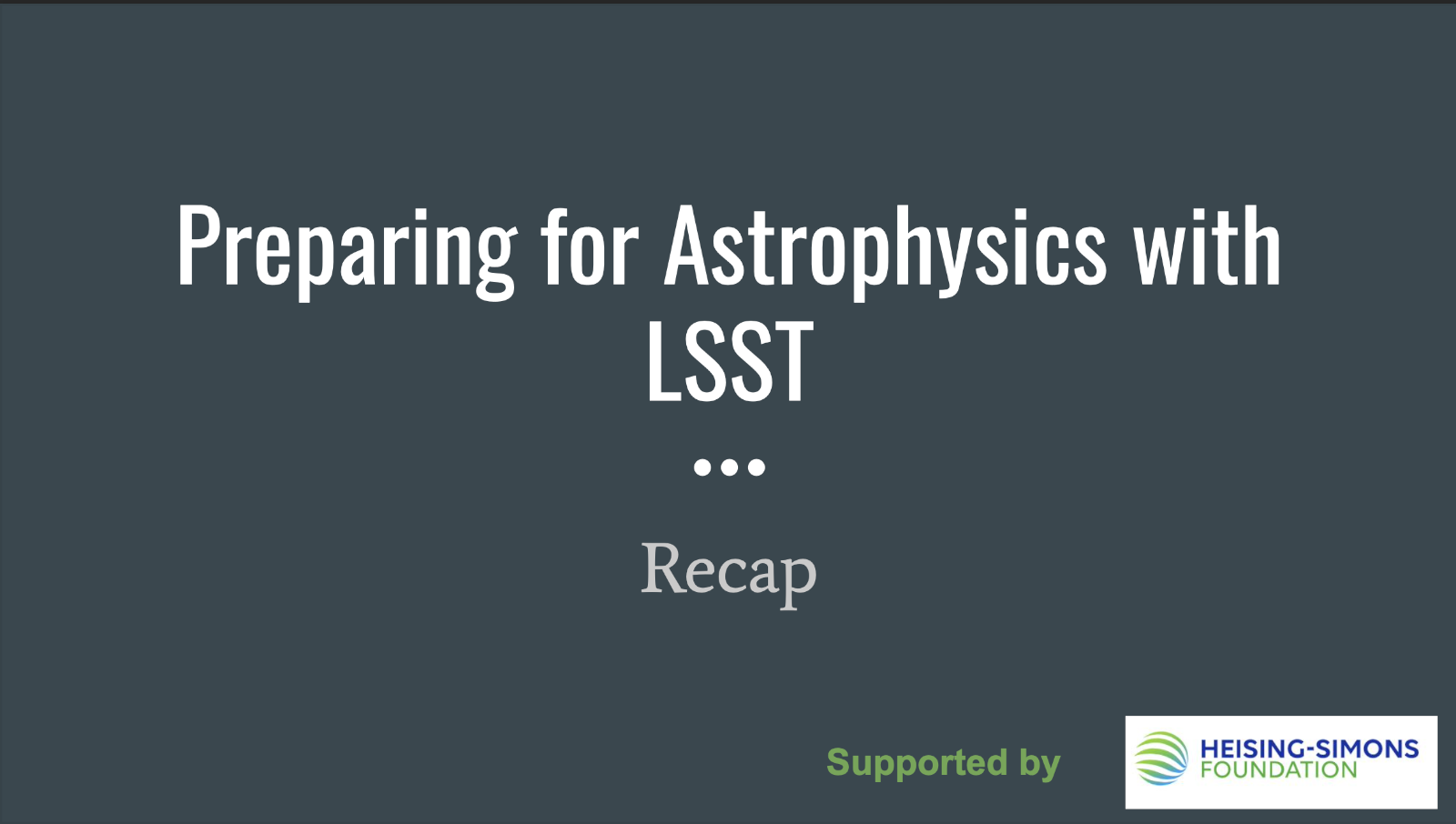Sept 8 & 9, 2021, 9-11am PDT / noon-2pm EDT / 6-8pm CEST
The goals of this informal workshop are to develop ideas for kickstarter research projects, foster collaborations, help new members to get involved, and answer questions about the program.
There is no registration fee, and everyone is encouraged to come and bring their ideas to the table.
Registration
The workshop is now finished but if you are interested in this program and would like to remain informed, please use this form to let us know!
Agenda
The workshop format will consist of a 2hr session each day, held in the Gather.Town meeting space.
Each session will start with presentations about the key aspects of the program, which will be repeated each day to give everyone more opportunities to attend.
The sessions will be informal, and attendees will be encouraged to give a short (optional) introductional to themselves and the type or subject of proposal they are considering or would like to get involved with.
All plenary sessions will be held in the "Plenary Room" at the top the GatherTown meeting space. Entering
this room will present you with a Zoom link which you should click to enter the session. After you leave
session, the system will return you to the GatherTown meeting.
Attendees can self-organize breakout sessions in any region of the GatherTown map, simply
by moving their avatars around the space to a mutually-agreed location. Please see the GatherTown tab for more information on the meeting space.
Day 1
| Rachel | Plenary Room | Welcome and Gather.Town overview |
| All | Plenary Room | Participants introduce themselves and interests |
| Rachel | Plenary Room | Grants program overview, answers to questions so far |
| Mario | Plenary Room | Introduction to LINCC Computing Facilities |
| Federica | Plenary Room | Review of grant concepts |
| All | Plenary Room | Discussion of breakout room topics, e.g.: |
| JEDI/Partnership proposals | ||
| Survey strategy | ||
| Commissioning activities | ||
| Science topic proposals | ||
| Software planning/development | ||
| All | Breakout Rooms | Breakout discussions |
| All | Plenary Room | Summarize breakout discussions, pose questions arising; opportunity to recruit team members |
Day 2
| Rachel | Plenary Room | Welcome |
| All | Plenary Room | New participants introduce themselves and interests |
| All | Plenary Room | Recap of Program Essential Information |
| Mario | Plenary Room | Introduction to LINCC Computing Facilities |
| All | Breakout Rooms | Breakout discussions/proposal development |
| All | Plenary Room | Summarize breakout discussions, pose questions arising; conclude with next steps |
The workshop will be held using the online meeting platform Gather.Town.
Please register to receive the connection details.
Map of the meeting space
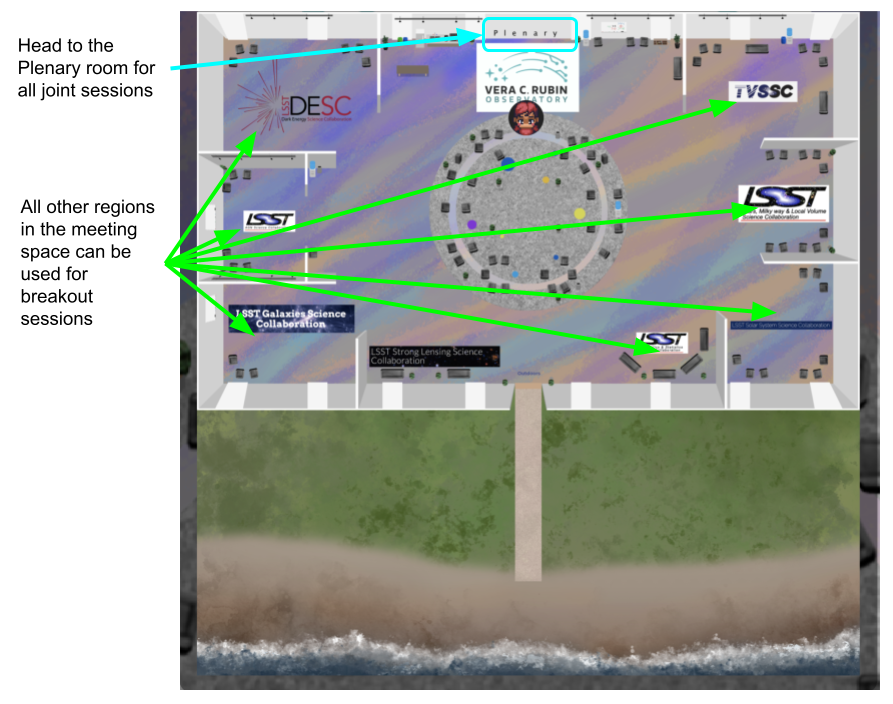
Controls
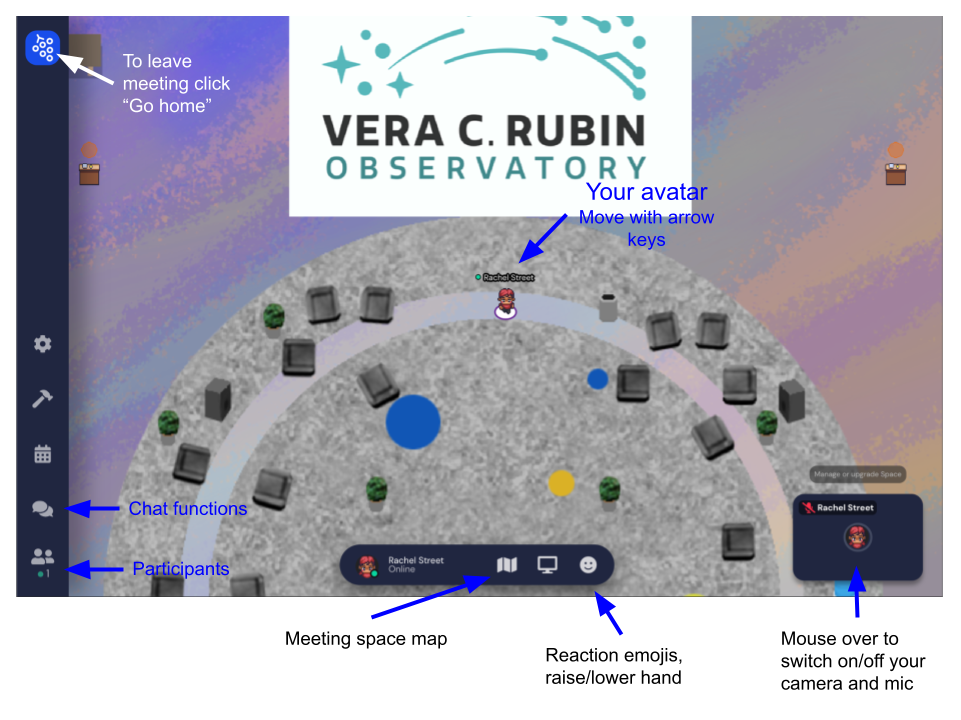
To move around the virtual meeting space, use your cursor keys or “W, A, S, D” keys
Use the “chat” at lower left to chat with individuals, people “nearby”, or everyone.
To mute or unmute your camera or microphone, click the white camera or microphone symbols over your video window.
To enter the plenary session, move your avatar to the top of the map and enter the door marked "Plenary". This will take you into a conference hall, and you will see a button in front of you marked "Click here to enter the plenary session". You will need to move your avatar close to this icon, to see a pop up instruction "Press x to interact". Press "x", and you will be shown the link to the plenary session meeting. Click the link to join the session.
The taskbar at the bottom of your display has the following items, reading left-right:
- Your avatar and your name and status
- Mini-map: click this to see the entire space. Useful if you get lost.
- Screen-share: click this to share your screen
- Reactions (“smiley face”): click this to raise your hand, wave, etc.
The navigation bar at the side of the display has the following controls (top to bottom):
- Bunch of grapes: Log out of the meeting
- Cogwheel: User preferences.
- Hammer: Meeting space configuration - not required
- Calendar: Meeting events calendar
- Message individuals, people nearby or the whole meeting
- Participants: See who else is in the meeting space
If you get really lost, go to settings (the cog icon on left), and scroll down to “respawn” your avatar in the meeting space. If all else fails, you can always close the browser tab or restart the browser, and join the meeting again.
Gathertown documentation can be found here.
Rubin Observatory enforces the AURA Harassment and Code of Conduct Policy. Harassment and unprofessional conduct (including the use of offensive language) of any kind is not permitted at any time and should be reported per the instructions in the Reporting section of this page.
Rubin Science Collaboration members are also expected to adhere to their Collaboration's Codes of Conduct.
Our Values
Rubin Observatory adheres to the following principles in order to provide a learning environment that produces rigor and excellence:
Be Kind
Acting with and encouraging kindness strengthens individuals, relationships, and communities.
Trust
An inclusive, collaborative environment is best achieved when there is mutual trust, based upon honest behavior, throughout the community.
Respect
Inclusive environments foster excellence by challenging us to consider a variety of viewpoints and approaches. We honor alternate viewpoints as opportunities for discussion and learning, and therefore treat others with respect, even if we disagree.
Diversity
In a diverse community, differences between people are recognized and acknowledged as assets. Our community is stronger, more creative, and more innovative because it is fueled by a broad range of ideas and perspectives.
Inclusiveness
Rubin recognizes the importance of actively including and encouraging involvement from all corners; diversity is only a benefit if all members feel empowered to participate. Quoting from the AAS guidelines: "Scientists should work to provide an environment that encourages the free expression and exchange of scientific ideas. They should promote equality of opportunity and fair treatment for all their colleagues, regardless of gender, race, ethnic and national origin (including Indigenous Peoples), religion, age, marital status, sexual orientation, gender identity and expression, disability, veteran status, etc. Scientific ability must be respected wherever it is found."
Inclusive environment
Guidelines are given to presenters encourage them to use color palettes and fonts that are suitable for color-blind and dyslexic participants. Dedicated Slack channels and social platforms with a dedicated hashtag will help people to follow essential parts of the discussions; this meeting's hashtag is #hst-lsst-sci-prep on the LSST Slack Team.
Participants are advised to be mindful and respectful of cultural differences between the participants. Many countries with very different cultural backgrounds, languages, and timezones are represented at this virtual meeting, and it is every participant’s duty to make sure everybody feels welcome in our community. The organizers have made an attempt to schedule the meeting at times that maximize participation across the globe but recognize that the schedule will not be suitable for everyone. Session recordings will be made available.
The program organizers firmly reject all kinds of abusive behavior. The organizers have worked towards providing a welcoming, safe environment that encourages the free expression and exchange of ideas of all the participants. Every attendee is expected to make their individual contribution towards a respectful and inclusive meeting climate. Any discriminatory behavior against colleagues on any basis, such as gender, gender identity, race, ethnic background, national origin, religion, political affiliation, age, marital status, sexual orientation, disabilities or any other reason will not be tolerated during any Rubin Observatory event.
All sessions may be recorded. As a presenter or participant of the meeting, your image and/or your voice may appear in recordings that may be publicly accessible. If you prefer your image not to appear, presenters and participants are welcome to keep the video muted. As a participant, to avoid your voice being recorded you may consider asking questions in the chat or on slack.
Presenters or attendees acting inappropriately or using inappropriate language may be muted (video, voice, chat) or removed from the meeting by the moderator.
Reporting bullying, harassment or aggression at the Workshop
The Program Lead, Rachel Street, (rstreet at lco.global) will act as the designated contact person for reporting instances of bullying, harassment, or aggression.
In the case that an event is reported, and with the approval of the reporting person, the designated contact person will approach the offending person(s) to discuss how their behavior is causing distress to other participants and remind them of the code of conduct applicable to all participants. If more serious measures are needed, the designated contact person should inform the reporting person(s) of the procedure to follow in these cases.
Should a participant witness events of bullying, harassment or aggression, the recommendation is to contact the person who suffered the abuse to show support, ask how they are doing, and possibly suggest for them to talk to one of the designated contact people. The decision to approach the contact person should, however, ultimately be left to the the person who suffered the abuse.
Principles of Engagement
The following are a few basic social rules, adapted from those of the Recurse Center. These rules make explicit certain norms of social behavior that help uphold our values stated in the Code of Conduct above, as well as the ethical guidelines we endorse. If you mess up on any of the below, don’t panic: we all make mistakes sometimes. Apologize, reflect, move forward. If someone points out that you have engaged in this behavior, it can be tempting to become defensive—but instead, apologize, reflect a moment, and move on.
No -isms
We explicitly ban racism, sexism, homophobia, transphobia, and other kinds of bias— whether these behaviors are overt or subtle. Subtle -isms can be particularly tricky, as they are often unconscious behaviors we engage in by mistake, and are sometimes caused by conflicting norms between cultures. To use an example from Recurse, saying "It's so easy my grandmother could do it" is a subtle -ism. Refrain from equating any category of people to a specific behavior.
Raise All Voices
During sessions and discussions, pay attention to who is contributing. Chairs are encouraged to be conscious of their biases and avoid preferentially selecting some people and/or paying attention to only some parts of the room. Discreetly invite contributions from quieter members of the group, making sure you are not embarassing them or drawing undesirable attention (ask "what do junior people think" or "people from smaller colleges" for example) and be conscientious of not dominating the conversation. We understand that it can be exciting to discuss a new idea, but always strive to listen (rather than just wait your turn to speak).
Take time to explain and do not belittle others
In an environment where participants have different backgrounds and knowledge, it is very important that people feel comfortable saying “I don’t know” or “I don’t understand.” Therefore, please do not act surprised when someone says they don’t know something, whether it is regarding a technical or non-technical subject (e.g. “What?! I can’t believe you don’t know what X is!”). Quoting from Recurse: "Feigning surprise has absolutely no social or educational benefit—instead, take time to explain so that all can follow and participate in the conversation.
Choose constructive, rather than demeaning reactions
If you experience these behaviors during the course of the meeting, you should feel free to bring it up directly with the person, or if it’s more comfortable, point out the behavior to the meeting organizers or one of the designated contacts mentioned in the reporting section above.
Thank you to Lucianne Walkowicz and Federica Bianco for contributing resource documents and language to this policy.
In addition to online meeting sessions, we will communicate with workshop participants primarily through email and Slack.
Workshop attendees are encouraged to subscribe to the LSST Slack Team channel #hsf-lsst-sci-prep. Those who are new to Rubin are encouraged to contact Federica Bianco (fbianco at udel.edu) for access.
To join the mailing list for this program, please complete this form.
Workshop Content
Here you can find the presentations that were presented at the meeting, together with recordings of the plenary sessions.

